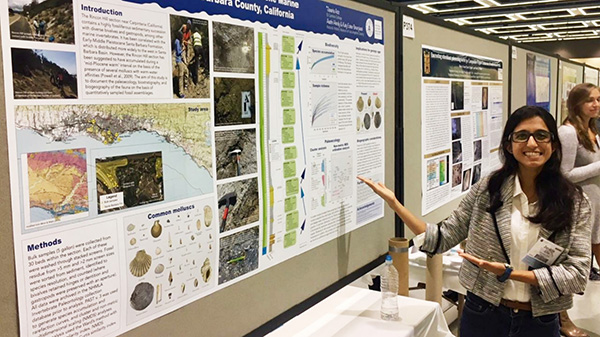Student Spotlight: Javaria Aziz
Geology student juggles fieldwork, class work and presents award-winning research
ECC geology major Javaria Aziz isn't afraid to get her hands dirty when digging into research. As a collections assistant at the Natural History Museum of Los Angeles County, Javaria is working on an independent research project near Carpinteria where a team of scientists is discovering new information about the area. Part of her work includes digging up fossils that range from 1 to 2 million years old. She then brings them to a lab and washes away all sediment so the fossils can be identified, cataloged and studied.
"This kind of research helps us study the age of this site, so if an animal is 2 million years old, we can also study the paleoecology of these animals and we can learn that they were a shallow-water species," said Javaria, who is currently looking into a future research project to study the sediment, including its properties and origins. "We can further understand the environment back then – this area was part of the ocean, part of the Santa Barbara Basin. This research proves what this particular area looked like, which has never been studied before. Every part of it is interesting!"
Javaria's field work crosses over into her class work; she presented her award award-winning research at the annual Honors Transfer Council of California Student Research Conference at UC Irvine. She has already twice presented "Biodiversity and Paleoecology of Plio-Pliestocene Marine Molluscs, Carpinteria, Santa Barbara County, California," based on data she gathered with the museum project. She works at the Natural History Museum's Invertebrate Paleontology Research and Collections Facility in Gardena, where she previously was an intern for two years.
Javaria traveled to Seattle with Natural History Museum staff to present research findings at the Geological Society of America Annual Meeting. The conference brought together about 7,000 geologists from around the world. In addition, Javaria was selected by the Paleontological Society, an international organization of several thousand paleontologists, to be one the group's first "Student Ambassadors."
She is a teaching assistant at ECC, a member of the Honors Transfer Program, and is also president of the college's very active Science Club, which has trips to Death Valley and national parks in Utah planned for the spring semester. She also arranged several tours of the Invertebrate Paleontology collection for ECC geology majors during the past two years.
"El Camino College is a great school and I love the Earth Science Department," she said. "It is big, but small enough to feel like a family. The faculty know us, and we know each other. Also, the field classes are amazing; there are so many opportunities for field work, which is crucial for a geology major. It's amazing that a community college could offer a such a big variety of field classes."
